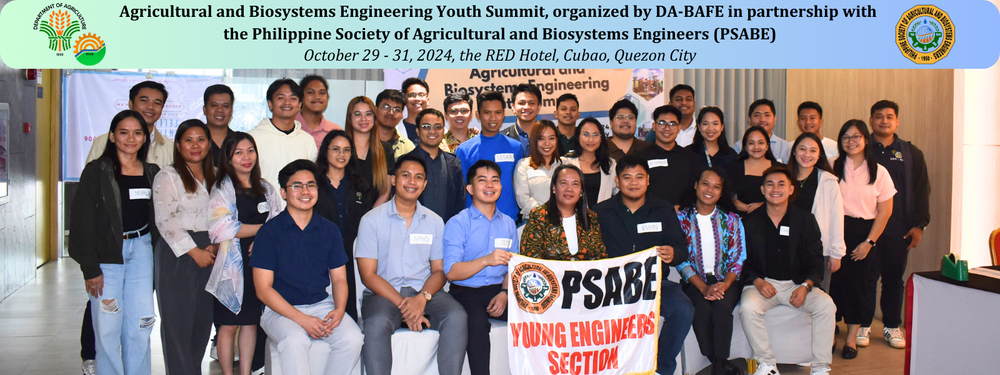

DEPARTMENT OF AGRICULTUREBUREAU OF AGRICULTURAL AND FISHERIES ENGINEERINGSugar Center, Annex II Building Extension, North Avenue, Diliman Quezon City




Quezon City — At a time when globalization opens doors to vast opportunities, a growing number of young Filipino agricultural and biosystems engineers (ABE) are choosing to stay grounded in the Philippines, applying their skills and expertise to uplift their homeland. The recent Agricultural and Biosystems Engineering Youth Summit highlighted this powerful sense of commitment as young professionals gathered to share knowledge and address some of the Philippines’ most pressing challenges. Against the backdrop of a rapidly developing global economy, these engineers are choosing to serve locally—a decision motivated by patriotism, purpose, and a profound sense of responsibility.
In her keynote address, DA-BAFE Assistant Director Juana Tapel PhD, a highly esteemed figure in the field of agricultural and biosystems engineering both locally and abroad, underscored the impact of this dedication to the Philippines. A veteran ABE with over 34 years of combined private and government experience, Asst. Dir. Tapel called on young ABEs to contribute their talents to local development, particularly in food security. “If all of us leave the Philippines, who will love our country?” she asked. “We have to help our country. Please… I am encouraging you to help our country, so that we can get up.” Her words resonate deeply at a time when many young Filipino engineers, skilled in critical fields like agricultural and biosystems engineering, face tempting opportunities abroad. For some, the allure of higher salaries and advanced training pulls them toward international positions. Yet, at this summit, the prevailing message was one of service to country and the Filipino people.

Throughout her address, Asst. Dir. Tapel drew on personal examples, particularly her own family, to highlight the sacrifices and commitments involved in this decision. Her children, she shared, have also chosen to base their careers in the Philippines, even though their fields—ranging from information technology to engineering—offer enticing prospects overseas.
Asst. Dir. Tapel’s experience illustrates how this call to serve transcends generations. Despite economic incentives to move abroad, her children’s contributions at home offer the Philippines a chance to retain valuable skills and resources. It’s a story that echoes among other young engineers, who, rather than simply seeking economic gain, are choosing paths of service and social impact.
The summit also highlighted a prevailing sentiment among young ABEs—one of principled commitment to their communities. Asst. Dir. Tapel emphasized that by staying, these ABEs can play a crucial role in tackling national challenges and reshaping the future of agriculture and food security. As Asst. Dir. Tapel pointed out, the stakes are high: “What is our contribution? In food security. Do we have a contribution? We should do it. Let’s help each other.”
The dedication of these engineers brings form of resistance against the “brain drain” that has long affected the Philippines, where some of the brightest minds seek stability abroad. Asst. Dir. Tapel, who was offered a career in the United States after studying there, exemplifies this commitment. She chose to return to the Philippines, driven by gratitude for the scholarship that had enabled her education. For Asst. Dir. Tapel, serving her homeland is not only a responsibility but also a debt of honor.
While the summit was a call to arms for young engineers to stay local, it also underscored the challenges they face. Beyond the familiar difficulties of limited resources and bureaucratic hurdles, many engineers encounter an educational system that they feel could better prepare them for real-world applications. Asst. Dir. Tapel pointedly addressed the need for improvements in the Philippine education system, especially as it pertains to engineering. “If our educational systems are neglected, we will feel it 5 to 10 years from now. We won’t feel it now,” she said, urging those in academia to train engineers with a focus on practical skills and ethical responsibility.
This sense of urgency reflects an awareness that the country’s long-term resilience depends on the quality of its education system and, by extension, the competencies of its engineers. Attendees of the summit were reminded that by staying and helping to bolster the nation’s infrastructure, they are not only aiding current generations but also investing in the future.
For many, the decision to stay is both a practical and moral one, driven by a belief that they can make a difference. Summit speakers reinforced that Filipino engineers have the potential to innovate solutions tailored to the country’s unique challenges, particularly in agriculture. By applying their skills locally, they can help address urgent needs like food security, environmental sustainability, and technological advancement.
“You need to strive for that,” Asst. Dir. Tapel told the young engineers. “I hope that the next days will be fruitful, as usual. And when you go home, I hope that you will remember what you learned here and share it with others.” ###DA-BAFE ICTST
As of
As of
As of




All contents are in the public domain unless otherwise stated.
Learn more about the Philippine Government, its structure, how Government works and the people behind it.

Sugar Center, North Avenue, Diliman, Quezon City.
